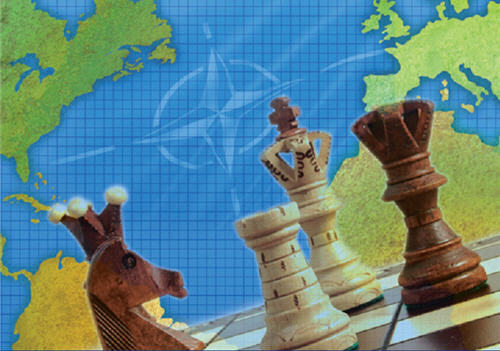
“Is NATO irrelevant?” That’s a question that Harvard’s Steve Walt asked on his Foreign Policy blog last week and a major subtext of the NATO Beyond Afghanistan conference held yesterday at the Atlantic Council.
Walt starts with the standard disclaimer: “NATO is by common consensus the most successful political-military alliance in modern history. It has lasted longer than almost all others, incorporates more members, and it achieved its central purpose(s) without firing a shot.” But, alas, that was two decades ago.
And the good professor identifies the most recent set of challenges: severe budget cuts on the part of several European Allies, the destructive effects that the long war in Afghanistan has had on our shared vision, and potential schisms over Turkey and other issues. Walt concludes:
Put all this together, and NATO’s future as a meaningful force in world affairs doesn’t look too bright. Of course, the usual response to such gloomy prognostications is to point out that NATO has experienced crises throughout its history (Suez, anyone?), and to remind people that it has always managed to weather them in the past. True enough, but most of these rifts occurred within the context of the Cold War, when there was an obvious reason for leaders in Europe and America to keep disputes within bounds.
He acknowledges that the Alliance handled the loss of its defining adversary better than critics, himself included, predicted. And he doesn’t think NATO will formally dissolve, because there’s a lot of sentimental attachment to it among leaders on both sides of the Atlantic. Rather, he believes it will simply fade into irrelevance.
Yesterday’s gathering of scholars and policymakers, most of them Atlanticists from way back, were mostly at a loss for how to reignite NATO in the wake of Afghanistan. Indeed, it was as pessimistic a gathering as I’ve seen on the subject. How gloomy was it? Luncheon speaker Bob Kagan, who eight summers ago told us “It is time to stop pretending that Europeans and Americans share a common view of the world, or even that they occupy the same world,” was among the most optimistic voices.
None of the panelists in the Political Will discussion had any illusion that there actually was any political will in NATO. At least, not in the publics of Western Europe. Kurt Volker, a career diplomat who served as President George W. Bush’s ambassador to NATO, said that “It is hard to overstate NATO’s lack of unified commitment and vision.”
And Council senior advisor Harlan Ullman, asking the first question, observed that “Political will is a polite way of saying relevance.” He didn’t find much disagreement. The closest we got was Josef Janning’s observation that “relevance is not absolute.” But even he conceded that “jobs” was the thing most voters care about these days and that defense spending was likely to have to be sold on that basis.
Former NATO assistant secretary general Edgar Buckley, first from the floor and later as a panelist in the NATO Military Transformation session, argued that we need the Next Big Idea around which to build the Alliance. He suggested moving well beyond traditional military and security roles to working on issues such as disaster relief and energy.
Former assistant secretary of defense Frank Kramer, suggested that the Alliance must work together on cyber security. Others offered related ideas for solving the problem by expanding it.
A few, Kagan included, argued that we should move in the opposite direction: Narrowing the mission to the defense of Europe or, perhaps, Europe “plus.” But it’s not at all obvious why the American taxpayer would want to continue to pay the lion’s share of the cost of an Alliance that exists only to defend a continent more than capable of paying for its own defense.
Volker observed that the new Strategic Concept, to be unveiled in Lisbon November 19-20, was supposed to answer these questions. But the combination of the global economic collapse and the worsening of the situation in Afghanistan has likely killed that ambition. Most likely, we’ll end up kicking the can down the road a bit, agreeing in the meantime on some vague platitudes about mutual cooperation.
There’s not much doubt that we’ll need NATO again. One can only hope it will indeed plug along until we can again agree it’s for and generate enough political will to man it.
James Joyner is managing editor of the Atlantic Council.
Image: stratcon-2010-crop_1.jpg
